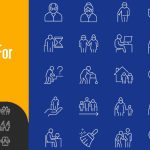
What Are The Biggest Challenges, Problems, and Concerns Facing Seniors Today?
Across the country, adults aged 65 and older are either looking forward to retirement or are already retired and living life on their own terms. Although older adults may have plans on how they want to enjoy life, they are also facing unexpected challenges that demand attention, especially as they get older.
Some of the most pressing concerns that are weighing heavily on seniors and forcing them to press pause on their plans include the following:
1. Rising Healthcare Costs
It’s a fact that with aging comes a greater risk of developing physical and mental health problems. According to the Centers for Disease Control and Prevention (CDC), over 93% of adults aged 65 and older reported having one or more chronic conditions.
Another reality is that each chronic condition comes with a cost attached. According to Greater Good Health, people aged 65 and over spend approximately $11,300 each year on medical care, which is two to three times the annual average healthcare cost for individuals in their 20s or 30s.
Many seniors, particularly those who have retired and live on a limited income, struggle to pay medical bills. Seniors cannot rely totally on Medicare because the federal health insurer only covers certain healthcare expenses.
Health care costs not only involve insurance premiums, deductibles, and co-pays for doctor visits, but also prescription medications, hospital stays, dental care, and vision care. Seniors who are frequently hospitalized because of chronic conditions may bear a greater share of healthcare costs.
2. Financial Security
Finances are usually a concern in any stage of adult life, but they become more critical after retirement. Not all seniors can build a solid retirement fund, and even those with savings are watching every dollar. Cost-of-living increases, inflation, rising healthcare costs, inadequate nutrition, job loss, or a medical emergency can all significantly impact an individual’s retirement savings.
The U.S. Census Bureau reports more than 17 million Americans age 65 live at or below 200 percent of the federal poverty level ($30,120 per year for a single person in 2024). Older adults who live above the poverty level are also at risk because it only takes one major adverse life event to nearly wipe out their savings.
As a result, some older adults turn to local, state, and federal programs, as well as community organizations, for help with food assistance and paying monthly bills. Since older adults are living longer, many seniors worry about whether they will be able to support themselves financially in the future.
3. Maintaining Independence
Many older adults say they want to age in place, meaning they want to stay in their homes for as long as possible instead of moving in with their adult children or to an assisted living facility or nursing home. To successfully age in place, older adults want to take care of themselves, just as they did when they were younger.
Advocates for seniors say that maintaining independence helps older adults take control over their lives, boosts their self-esteem, and gives them a sense of purpose. It also keeps them mentally and physically active, and helps them to feel useful rather than feeling like a burden on their family members or friends.
4. Difficulty With Everyday Tasks
Cooking, sweeping, dressing, and grooming oneself are just a few of the many daily tasks that are done each day. However, these activities can become more challenging for seniors with mobility and agility problems, hand disorders, carpal tunnel, and other debilitating conditions. If their health conditions worsen, older adults may eventually have difficulty with personal grooming and bathing, driving, and doing household chores.
Difficulty with daily tasks is a common, often overlooked issue for older adults who fear losing their independence because they struggle to manage daily activities independently.
5. Falls and Injuries
Falls are the leading cause of injury for adults aged 65 years and older, according to the U.S. Census Bureau. Additionally, figures from Public Health Reports show falls are also the leading cause of injury-related death in this population of adults, and the fall death rate is increasing.
Falls can have a domino effect. Injuries resulting from a fall may require hospitalization, followed by recovery at home, possibly with the assistance of a caregiver or in a nursing facility.
Not all falls, however, have serious consequences. According to the CDC, about 37 percent of people who fall reported an injury that required medical treatment or restricted their activity for at least one day.
6. Long-term Care Costs
When older adults require assistance, many depend on spouses, adult children, other family members, and close friends to provide short-term support. However, seniors become concerned when a condition requires long-term care, whether it’s home care, assisted living, or nursing home care. Unless older adults have long-term care insurance or a strong social support system, long-term care can potentially drain their savings if they cannot find financial resources to help them.
7. Social Isolation and Loneliness
As seniors age, they find their social circles becoming smaller as they stop working or their spouses die, or family members and friends move away. In some instances, older adults may have to leave their familiar surroundings and live with their adult children, in an assisted living facility, or in a nursing home, due to health, financial, or other reasons. Grieving the loss of those who provided emotional, economic, or social support can not only lead to social isolation but also depression.
Mobility limitations or a lack of transportation reduce the opportunities for social interaction, which can also lead to social isolation and loneliness.
8. Decline in Cognitive Health
Cognitive health is a concern for adults of all ages, but particularly older adults who are more at risk for cognitive disorders than younger people. Cognition involves a person’s thinking, learning, and memory skills. Some degree of cognitive decline, such as forgetting names or misplacing keys, is considered a normal part of aging. This type of mild memory loss does not disrupt one’s daily living.
The cognitive health issue that affects the lives of older adults the most is dementia, a term for several diseases that gradually affect thinking, learning, and memory skills. The most common form of dementia is Alzheimer’s disease, which causes progressive damage to the brain and loss of basic functions such as swallowing, eating, and breathing.
More than seven million Americans 65 and older are living with Alzheimer’s, according to the Alzheimer’s Association. Also, 1 in 3 older Americans dies with Alzheimer’s or another dementia. There is currently no cure for Alzheimer’s disease, but there are medications that treat the condition.
While older adults have many concerns, adopting a healthy lifestyle, staying informed, seeking financial advice, and maintaining social connections are essential steps to protect their well-being and independence.
Source Links:
https://www.chenmed.com/blog/top-5-concerns-facing-seniors-today
https://www.cdc.gov/pcd/issues/2025/24_0539.htm
https://greatergoodhealth.com/patients/understanding-senior-healthcare-costs-and-free-options/
https://www.ncoa.org/article/get-the-facts-on-economic-security-for-seniors/
https://www.cdc.gov/falls/data-research/index.html
https://www.alz.org/alzheimers-dementia/facts-figures







